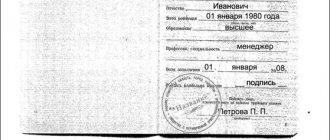What is this?
The agreement confirms the free transfer of housing in houses with state and municipal ownership into the personal property of individuals and it looks, accordingly, the same as any similar document.
The right to free privatization can be used by individuals registered in the apartment, as well as those who are absent but have not lost the right to space in the residential premises.
The following are considered as objects of privatization:
- separate housing;
- rooms in communal apartments.
It should be emphasized that concluding an agreement of this kind is a right, but not an obligation, of citizens.
According to the Constitution, the Civil Code of the Russian Federation and the Housing Code of the Russian Federation, a person cannot be forced to acquire ownership of an apartment through privatization.
Documents to be drawn up
Execution of the contract requires the provision of a package of documents:
- a written statement typed or filled out by hand in blue or black ink;
- copies of passports of all persons wishing to participate in free privatization;
- copies of birth certificates of minors participating in privatization;
- a copy of the order for moving into the residential premises or the agreement on the use of the apartment as a social rental;
- cadastral passport (since 2013 it is not included in the list of mandatory documents and is provided at the request of the applicant);
- permission for the procedure from the guardianship authorities, if the dwelling is inhabited exclusively by persons under eighteen years of age;
- certificates from previous and current places of residence stating that the right of privatization by interested parties has not previously been exercised;
- consent of all family members to privatization, expressed in writing in any form, or a written refusal to participate in it.
At the time of signing the contract, you should have with you the original documents , copies of which are included in the above list.
An example of an application for drawing up a contract.
Sample apartment privatization agreement.
Decor
Legally, the beginning of the contract execution procedure is marked by filing an application in the prescribed form.
The document preparation procedure is completed within two months. Refusal to provide a service is possible in three cases:
- There are not enough documents in the package;
- the person has already used the right to privatize housing;
- residential premises do not belong to the property of the Russian Federation.
The public service is provided to applicants free of charge by executive authorities. In Moscow, it is implemented through the Housing Privatization Directorate of the Municipal Housing Department. In St. Petersburg, the decision is made by the St. Petersburg State Budgetary Institution Gorzhilobmen (St. Petersburg State Budgetary Institution "Gorzhilobmen") and the Housing Committee.
To receive the service, a person applies to the MFC in person or sends his representative there on the basis of a notarized power of attorney.
An alternative method of submitting an application electronically through the government services portal has also now . Before filling out the application, the package of documents must be scanned or re-shot with a digital camera and digital copies of the papers listed above must be attached to the application for privatization of residential premises sent via the Internet.
After sending data through the portal, you need to monitor the email entered by the applicant when filling out the application. The authority responsible for the provision of the service will send notifications about the progress of the application and may invite the individual to appear in person at the organization providing the service.
Having prepared the contract, the executor sends the applicant a written invitation to appear at the appointed time to sign this document.
On the specified date, all interested parties come to the MFC, get acquainted with the document, check if there are any errors there . Then everyone signs the apartment privatization agreement, after which it is stitched, sealed with a hologram and handed over to the applicants.
This document is the basis of a set of papers with which you should visit Rosreestr in order to register ownership of housing and be able to carry out various types of transactions with real estate (sale, exchange, donation, etc.).
§ 3. AGREEMENT FOR TRANSFER OF PRIVATIZED HOUSING TO CITIZENSIn accordance with the Law on the Privatization of the Housing Stock, the transfer of residential premises into the ownership of citizens is carried out by the relevant local administration bodies, enterprises and institutions to which the housing stock is assigned, respectively, with the rights of economic management or operational management. Such transfer is made on the basis of an agreement between the above-mentioned bodies and organizations and citizens purchasing housing as their own. An agreement on the transfer of housing into the ownership of citizens is concluded by a local administration body, an enterprise, an institution with a citizen receiving residential property in ownership, in the manner established by the relevant executive authority. The contract for the transfer of housing through privatization differs from the contract for the purchase and sale of residential premises in that, unlike the contract for the sale and purchase; which is of a paid nature, the contract for the transfer of housing through privatization is free of charge. A housing transfer agreement is similar to a gift agreement, however, unlike a gift agreement, under which the donee only accepts the gift (or refuses it), in a housing transfer agreement by privatization, the person who wants to privatize housing takes the initiative to do so by submitting an application (request) for the transfer of housing to him. Citizens are also obliged to use residential premises only for living, and to carry out reconstruction and redevelopment in residential premises only with the permission of the local administration. At the same time, when citizens privatize apartments in buildings requiring major repairs, the landlord retains the obligation to carry out major repairs in accordance with the standards for the maintenance, operation and repair of the housing stock. Maintenance and repair of a residential building as a whole, according to the transfer agreement, is carried out by housing maintenance and repair and construction organizations servicing this house before the start of privatization. The agreement for the transfer of an apartment into the ownership of citizens is concluded in simple written form, is not subject to notarization, and no state duty is charged on it (Article 7 of the Privatization Law). In the application of citizens for the transfer of ownership of residential premises to them, they indicate into which common (joint or shared) ownership they are asking to transfer the apartment they occupy, the members of the tenant’s family, and their consent to privatization are indicated. The contract for the transfer of residential premises into the ownership of citizens also includes minors who have the right to use this residential premises and live together with persons to whom this residential premises is transferred into common ownership with the minors, or minors living separately from these persons, but who have not lost the right to use this property. living space. Citizens acquire ownership rights to privatized residential premises after (from the moment of) registration of the agreement with the BTY. In addition to the text of the agreement, the citizen privatizing residential premises receives a certificate of ownership of the privatized apartment (residential building). In practice, there are cases when during the life of the tenant the privatization of the residential premises was not completed, in particular in connection with his death during the period when the privatization of the apartment was being processed, and often the courts receive statements of claim to recognize the deceased as the owner of the apartment. The Plenum of the Supreme Court of the Russian Federation, in its resolution No. 8 of August 24, 1993, explained that if a citizen who submitted an application for privatization and the necessary documents for this died before the execution of an agreement for the transfer of housing into ownership or before the registration of such an agreement with the relevant local administration body , then if a dispute arises regarding the inclusion of this residential premises or part of it in the inheritance mass, it must be borne in mind that this circumstance in itself cannot serve as a basis for refusing to satisfy the heir’s claim. The housing legislation of the Russian Federation provides for the opportunity for a tenant living in a communal apartment to purchase residential premises for the other tenants of this apartment with their consent and transfer these premises into their ownership, and occupy the entire apartment himself without additional payment and privatize it in the prescribed manner (see. Article 16 of the Law on the Fundamentals of Housing Policy). In addition to the agreement on the transfer of ownership of the apartment, citizens are issued a Certificate of Housing Ownership in the prescribed form. Citizens who have become owners of residential premises own, use and dispose of them at their own discretion; they have the right to sell, bequeath, rent or lease these premises, as well as make other transactions with them that do not contradict the law (see Article 3 of the Law on Privatization). At the same time, citizens who are the owners of residential premises exercise the rights of ownership, use and disposal of residential premises belonging to them in accordance with its purpose, that is, for the residence of citizens (the owner himself, members of his family) or by renting it out to other persons on the basis of an agreement. Members of the owner's family living in residential premises belonging to him, including those transferred through privatization, have the right to use this premises under the conditions provided for by housing legislation. They have the right to demand elimination of the violation of their rights to residential premises from any persons, including the owner of the residential premises. To carry out transactions in relation to privatized residential premises in which minors live, regardless of whether they are owners, co-owners or family members of the owners, including former owners, who have the right to use this residential premises, prior permission from the guardianship and trusteeship authorities is required. This rule also applies to residential premises in which minors do not live, but at the time of privatization they had equal rights to this residential premises with the owner (Part 2 of Article 3 of the Law on Privatization was introduced by Federal Law of August 11, 1994 No. 26-FZ ). Funds from transactions with privatized residential premises in which only minors live (lived) are credited by parents (adoptive parents), guardians (trustees), administration of children's or other educational institutions of the relevant purpose to a deposit account in the name of the minor at a local branch of a savings bank (h 3 Article 3 of the Law on Privatization was introduced by Federal Law of August 11, 1994 No. 26-FZ). Citizens who become owners of an apartment assume responsibilities for paying real estate taxes, reimbursement of expenses for repairs, operation and maintenance of the apartment, house, its engineering equipment and local area based on the agreement of the parties to the transfer agreement. The current tax legislation provides that the tax on privatized area is 0.1% per year of its assessed value, determined by the BTI. In practice, sometimes there are cases of deprivatization of residential premises, which is expressed in the fact that a citizen, who at one time exercised his right to privatize housing, renounces the ownership of this premises, remaining to live in it as a tenant. As motives for the deprivatization of housing, citizens put forward the following grounds: privatization under the influence of deception, violence, threat, or significant misconception; fears of incurring significant financial costs (elderly people are especially afraid of this); the desire not to take on the responsibility of reimbursing the costs of home repairs; the desire to obtain a larger municipal area in exchange for the occupied apartment, etc.). The issue of deprivatization of housing is decided by the executive authority or local government. Based on the application of citizens who wish to renounce the right of ownership of privatized residential premises, the relevant executive body, local government body or persons authorized by them accept the residential premises transferred to them, with the inclusion of this premises in the prescribed manner in the state or municipal housing stock, and conclude with social tenancy agreements for this premises by such citizens. In case of a dispute, the issue is resolved by the court.
How to recover?
To restore a lost contract, you should contact the authority where the privatization was formalized. They will issue a duplicate of the document.
If a citizen at one time received a certificate of ownership based on a privatization agreement, then there is no need to apply to Rosreestr again.
When selling a residential property acquired in this manner, the buyers or their agent will want to know exactly how the property was acquired and will want to review this document.
It is possible that it will be possible to use the right of free privatization until 2021, but while the corresponding changes to the legislation are only expected, it is worth hurrying in order to have time to transfer the apartment from state ownership to private ownership.
Contents of the act of acceptance and transfer of a land plot with a house to the real estate purchase and sale agreement
There is no official definition of this act in the legislation, however, in Part 1 of Art. 556 of the Civil Code of the Russian Federation, this document is indicated as confirmation of the fulfillment of their obligations for the transfer and acceptance of real estate and is mandatory for the parties.
IMPORTANT. The seller’s refusal to sign the transfer and acceptance certificate of the land plot with the house to the real estate purchase and sale agreement indicates a violation of the terms of the purchase and sale agreement. If the completed form does not indicate any defects in the purchased property that are subsequently discovered, the seller bears responsibility.
The act must contain:
- Indication of the data of the parties to the transaction in the act is mandatory.
- It is necessary to describe in the act the data of the property, including its condition.
- The drawn up act must indicate the details of the purchase and sale agreement for the transferred real estate.
- Both parties must confirm the absence of claims regarding the transaction, which is indicated in the corresponding column by the signatures of the participants in the acceptance and transfer.





